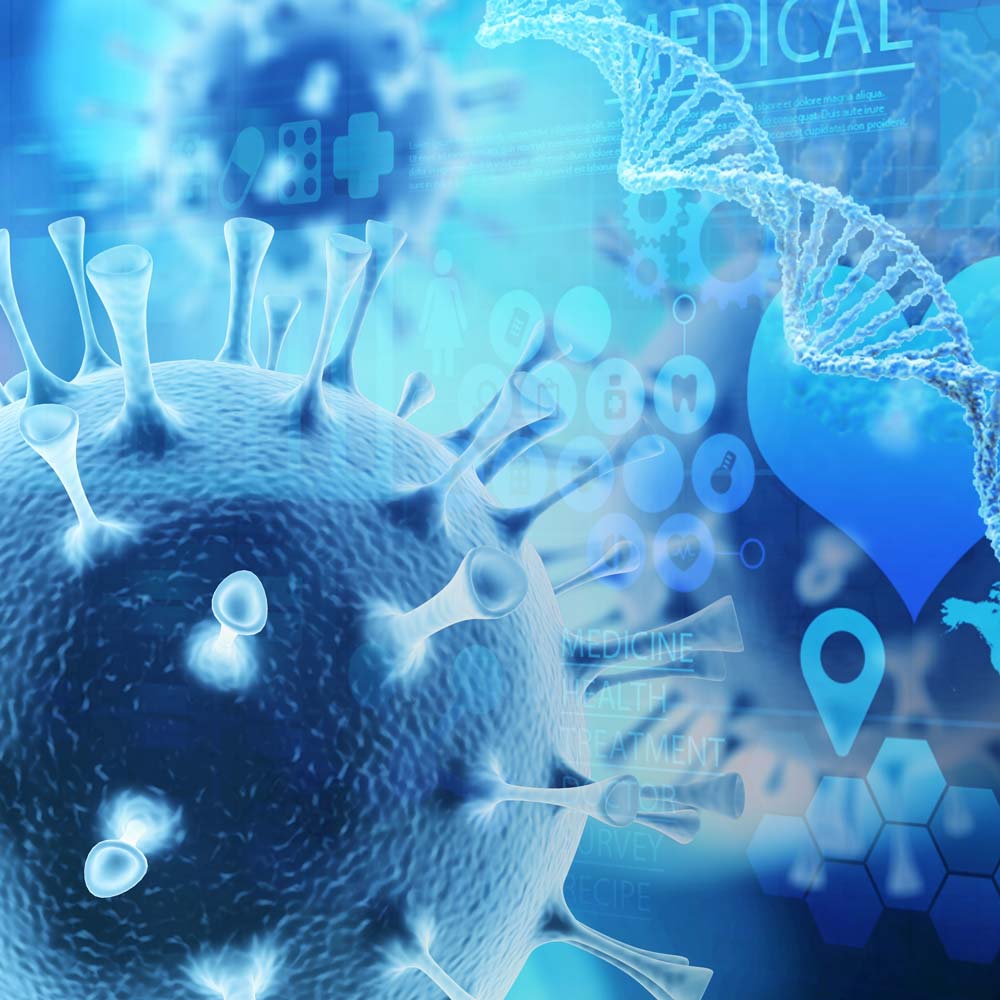Viral diseases
Medical Studies on Melatonin – Viral diseases

Melatonin is, in a sense, a star among the body’s natural antioxidants, because it fights and neutralises free radicals down to the cellular level, protecting DNA from damage. But its potential as a free radical catcher doesn’t stop there – melatonin is also able to stimulate the cells’ production of further free-radical interceptors, which further boosts its anti-oxidative effect.
Strengthening the immune system
These properties are of particular interest for fighting and treating viral diseases such as Ebola and herpes as well as those caused by coronavirus, such as 2019-nCoV. In addition, melatonin boosts the immune system, which is a key factor of any successful therapy, especially during viral pandemics.
Melatonin protects cells
Viruses always need host cells to replicate in the human organism. One way to treat viral diseases is therefore based on preventing this process. Studies are increasingly suggesting that coronaviruses in particular attack human cells via ACE2 (angiotensin-converting enzyme 2).
Melatonin and coronaviruses
Melatonin indirectly regulates ACE2 expression and has been deemed to be a promising agent in the fight against coronavirus in several studies, as it could prevent infection of these cells. At the same time, it also prevents the premature cell death of these infected cells (apoptosis), which not only slows the spread of infection but also buys the immune system more time to adapt to the infection.
Medical Studies on Melatonin – Viral diseases
Background: As an infectious disease caused by the severe acute respiratory syndrome coronavirus 2 (SARS-CoV-2), the common signs of coronavirus disease
Suppressive therapy of recurrent genital herpes is a challenge, and melatonin may be an alternative. Objective: To evaluate the action of melatonin,
Acute HSV-1 infection is associated with mild symptoms, such as fever and lesions of the mouth, face and skin. This
In all mammals, the circulating pool of MLTs is synthesized in the pineal gland during the night’s darkness hours. Its
Coronavirus disease 2019 (COVID‑19), a systemic illness caused by severe acute respiratory distress syndrome 2 (SARS‑CoV‑2), has triggered a worldwide
This review assesses the antiviral potential of melatonin through comprehensive analysis of studies across human subjects, animal models, cell cultures,
Melatonin, an endogenous indoleamine, is an antioxidant and anti-inflammatory molecule widely distributed in the body. It efficiently regulates pro-inflammatory and
Coronaviruses (CoVs) usually affect the respiratory system of mammals causing mild to severe infections. In the past two decades pathogenic
COVID-19 is a complex disease with short- and long-term respiratory, inflammatory and neurological symptoms that are triggered by the infection
Despite intense investigation, the pathogenesis of COVID-19 and the newly defined long COVID-19 syndrome are not fully understood. Increasing evidence
Numerous pharmaceutical drugs have been repurposed for use as treatments for COVID-19 disease. These drugs have not consistently demonstrated high
Infection of humans with SARS-CoV-2 virus causes a disease known colloquially as "COVID-19" with symptoms ranging from asymptomatic to severe
This study aimed to determine the effect of melatonin on thrombosis, sepsis, and mortality rate in adult patients with severe
SARS-CoV-2 has ravaged the population of the world for two years. Scientists have not yet identified an effective therapy to
Viral infections constitute a tectonic convulsion in the normophysiology of the hosts. The current coronavirus disease 2019 (COVID-19) pandemic is
In experimental conditions, it has been demonstrated that vaccine efficacy and the toxicity is depending on cytokine-induced immunoinflammatory response, and
Melatonin has been known as an anti-inflammatory agent and immune modulator that may address progressive pathophysiology of coronavirus disease 2019
Coronavirus (SARS-CoV-2) is spreading rapidly in the world and is still taking a heavy toll. Studies show that cytokine storms
Coronavirus disease-19 (COVID-19) is a complex disease that causes illness ranging from mild to severe respiratory problems. It is caused
Coronaviruses (CoVs) are a group of single stranded RNA viruses, of which some of them such as SARS-CoV, MERS-CoV, and